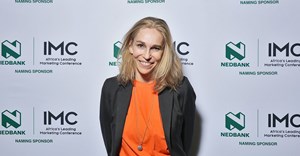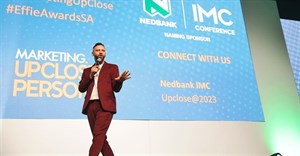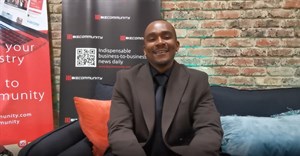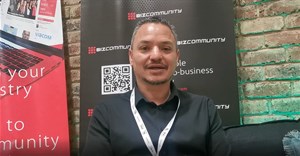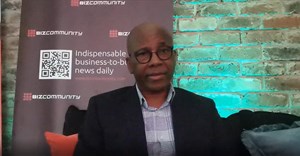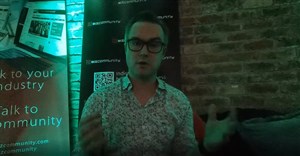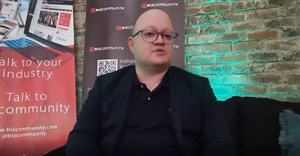Trending



 Sabre EMEA 2024 Awards: Razor PR, Retroviral top SA agenciesDanette Breitenbach
Sabre EMEA 2024 Awards: Razor PR, Retroviral top SA agenciesDanette Breitenbach

Elections 2024
Jobs
- Marketing Manager George
- Senior Digital Marketing Communications Specialist Cape Town
- Marketing Channel Manager George
- Head of Marketing Johannesburg
- Corporate Fundraising Officer Cape Town
- Account Executive Cape Town
- Junior Graphic Designer Germiston
- Digital Marketing Internship - Paid Position Centurion
- Digital Marketing Account Manager Centurion
- Digital Marketing Manager Cape Town
#NedbankIMC2020: Andy Rice's four-box model for effective brand strategy

Rice spoke about change. "Change is inevitable, as the saying goes and of course with the qualification of not from a vending machine." He went back to marketing basics to remind us that we can hardly discuss what may or may not have changed if we don't start with a common understanding as to what marketing is and what it is expected to do and whether it is fundamentally resistant to change. He said that the theme of the conference suggests that the pandemic has in some way made marketing less important as a business discipline, but he believes the opposite is true and that now more than ever, marketing works.
He told a brief story about Unilever's "blockbuster detergent brand", OMO, which was launched in South Africa in 1963. Sixteen years later, he was part of the Ogilvy team working on the Unilever account, of which OMO was the star brand: "Its target audience was huge, what we might simply call 'the women of middle South Africa', and a huge market needed a huge media, and so it was that the Sunday Times was the brand to lead media... and print was the premium medium for any brand with ambition. Fast forward 40 or so years and today OMO is still a massively strong weapon in the Unilever armory."
Commenting on what has changed in those four decades, he said that although OMO has new competitors, new technologies, new customers and new media channels, what hasn't changed is the core brand message and that is that OMO believes in the vital role that every mother can play in raising their kids, especially by encouraging them to play, hence the long enduring proposition, 'dirt is good'.
"This strategy is rooted in as deep-seated human truth, the responsibility of motherhood as you could expect to find, and that's why while everything else changes, the OMO proposition doesn't. The advent of TV didn't change it, the proliferation of new online channels didn't change it and a pandemic isn't going to change it either. Mothers will always be mothers the world over."
He said not to be fooled by what is actually superficial change.
You need to dig deeper to find the truth and in the case of Covid-19, brands can be affected and even categories can be affected by what is after all probably the world's largest sampling campaign since Santa Claus first put reigns on a reindeer.He went on to say that people are obliged when their preferred brand is unavailable to try an alternative, and that by chasing short-term changes, the brand finds itself unable to keep up and confusing agility with inconsistency.
He said you need to make the effort to get to the real soul of the category and of your brand and that if you want your marketing investment to work, you need to get to the heart of the matter, especially with regard to your brand positioning, what you want your brand to be known for.
So Rice shared his model for effective brand strategy, which is simply of four quadrants each containing a word and each representing a component of every successful, sustainable, change-resistant brand.

The first is ‘profitable’. He said to never forget that marketing is a commercial enterprise. “If it doesn’t help meet the business objectives, it’s not helping at all, other than to give your financial director an opportunity to say in gloating terms, ‘I told you so’.” So, he recommends stress testing every major activity and strategy and understanding the difference between outputs and outcomes.
The second is ‘fulfillment’. There is very little point in getting consumers fired up about your brand if they can’t get hold of it, said Rice. “Obvious, I’m sure you will agree, but sometimes it’s not that obvious. One of my favourite observations, and I wish I knew who wrote it, was as follows: ‘Stategy without implementation is a daydream, implementation without strategy is a nightmare’. This is why fulfillment is so important, he said, as is recognising that the ease of working a supply chain can be as strong a determinant of the brand’s success as the promise of the brand itself.
The next is ‘unmet’.
The word differentiation represents what could be the most important 15 letters in the lexicon of marketing. Your considered differentiation is commoditisation, which is a desperate fate for any brand that allows itself to be fooled into adopting ‘me too’ strategies fed by category generic propositions. I’ve lost count of how many times I’ve heard it said that if it’s good enough for the market leader, it’s good enough for my brand. That attitude is a naïve and lazy copout, as is the argument that a category is intrinsically commoditised.He quoted, ‘There is no such thing as a commodity market, only a commodity mindset,’ and believes that “the beauty and power for providing a solution for previously unmet needs is a thing of wonder to behold. Of course, you need to know which competitors you’re differentiating your brand from, but this is not as obvious as you might think, especially if your category is undergoing change.
The last is ‘needs’. This is where relevance comes in. “It’s easy enough to differentiate your brand but less so to do it in a relevant way… Words like ‘artificial’, ‘faddish’, ‘temporary’ spring to mind when relevance is lacking, when the offer does not reflect a true need.
“Even what appears to be a lesser, secondary need can be worth investing in. I only believe in investing in it consistently.”
He said a good guide in the hunt for unmet needs is to start by ignoring the product within the brand, ignoring the current category expectations and focusing on the consumer’s lifestyle. “Find a true need in their lives, rather than in their category behaviours and find a creative way to align your brand with that need and you’ll have the basis of the first and most sustainable, and I should add, change resistant strategy foundations.” He said this is how Unilever found the strategy gem that OMO has exploited for nearly 50 years, motherhood expressed as a counterintuitive promise that dirt is good.
Bizcommunity attended the Nedbank IMC 2020 live stream. Follow @IMCConf @IMCConference #NedbankIMC2020 #MarketingWorks for some standout insights.








